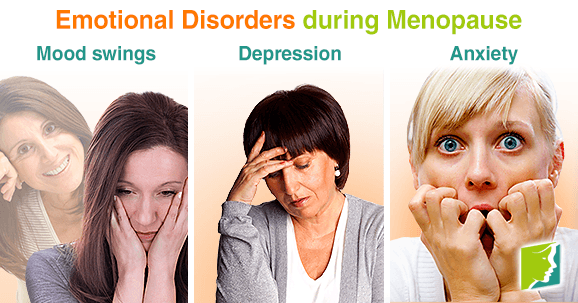Menopausal women are classical portrayed as being moody, angry, and irritable. Any truth in this representation however, comes from women's experience of the many menopause symptoms they are exposed to during the transition to infertility. Common symptoms that can leave you feeling on edge include hot flashes, sleep disorders, and physical changes. The good news though is that the experience isn't permanent. Keep reading to find out more about how menopause affects your emotions and moods.
Hormonal Changes during Menopause
Hormonal fluctuations feature significantly during a women's menopause experience. Continue reading to find out how hormone imbalance affects your body.
Hormones Explained
Estrogen - a little hormone that makes a big difference. This hormone doesn't just control the female reproductive system; it also plays a huge part in the digestive system, skeletal system, nervous system, muscular system, and circulatory system. In addition, estrogen affects the production of testosterone and progesterone. Because of all of its multiple roles and responsibilities, when estrogen levels fluctuate, your entire body becomes effected by the trials of menopause, not just your reproductive organs.
In addition to the many physical changes women suffer from during menopause, emotional changes are also common. Read on to discover more about emotional disorders during menopause.
Emotional Changes during Menopause
Emotional changes are generally linked to menopause, some women however, consider alterations in mood as signs and symptoms of depression. Keep reading to learn the difference between these two similar experiences.
Mood Swings Explained
One of estrogen many roles is to increase the synthesis of serotonin in the brain, the chemical that works to regulate your mood. When you have extremely low levels of estrogen, you could be suffering from serotonin deficit and low mood as a result. If you suffer from hot flashes, night sweats, and the sleeplessness low estrogen levels can cause, this will only contribute to your bad moods.
Depression Explained
The direct effect of estrogen on serotonin levels explains why menopausal women are more prone to depression and mood swings. Estrogen is also linked to the stress hormone cortisol. It is thought that when estrogen levels are low, cortisol production goes into overdrive, resulting in high levels of stress in the body.
Anxiety Explained
Like serotonin, the brain chemicals norepinephrine, dopamine, and melatonin also play a part in your emotional well-being and are stimulated by estrogen. An imbalance in these chemicals can lead to menopausal anxiety, which leaves people feeling like they are constantly unravelling. Anxiety also spurs panic attacks, or periodic episodes that manifest themselves as chest pains, accelerated breathing, hot flashes, and sometimes even thoughts of imminent death.
More Information
Women are much more likely to experience emotional disorders then men, and this is due in part to the effects of fluctuating hormones and hormonal imbalance on the body.
Sources
- BMJ Group. "Menopause: What is it?" Patient Leaflet. 2007.
- Hopkins, Virginia. Lee, John R. M.D. What Your Doctor May Not Tell You About Menopause. New York: Warner Books Inc., 1996.
- Love, Susan M.D. Menopause and Hormone Book. New York: Three Rivers Press, 2003.
- Martin, Raquel. The Estrogen Alternative. Rochester, VT: Healing Arts Press, 2000.




